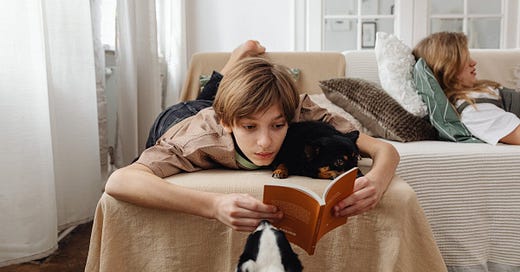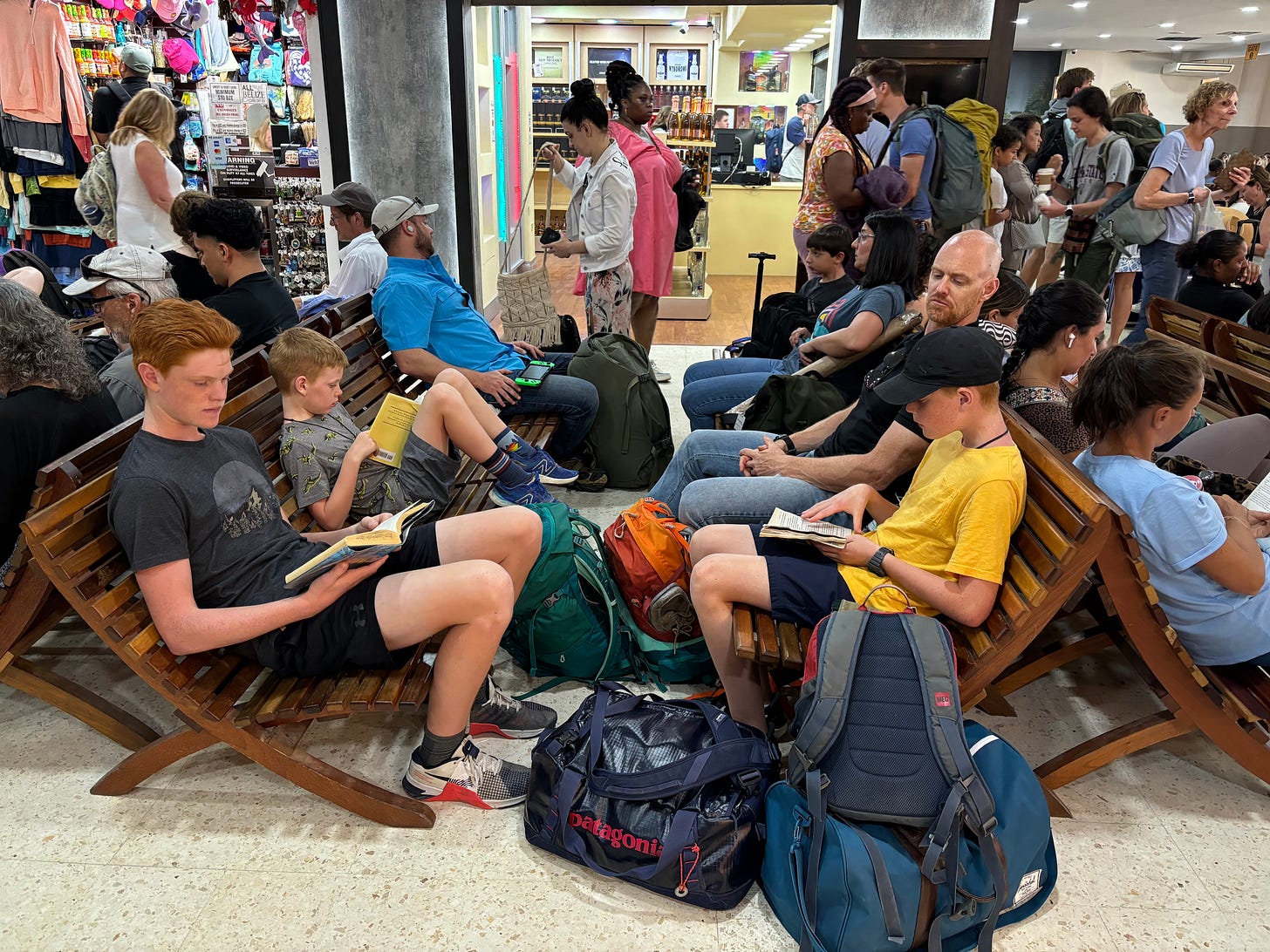A great deal of attention is given to independent, free play as being a replacement for screen time. Something else has to “fill the void” that is left when you take digital devices away, and old-fashioned play is the obvious substitution. There is another component to filling time, however, that gets less attention, and that is reading. In our family, we read a lot, and I would say that books are on par with free play when it comes to keeping my kids occupied. I don’t know what we would do without either one.
Reading complements active playtime beautifully, and both are integral parts of being able to pull off a digital minimalist lifestyle successfully. Kids cannot play wildly and energetically all day long without crashing at some point, and that is when they need to do something that is quiet and sedentary. Without books, I struggle to imagine how you would keep kids entertained or engaged indoors when the weather is bad, or it’s dark in the evenings, or you’re in the car for hours, or you simply need silence in the home. There are only so many crafts you can do, but reading feels limitless.
Books are the age-old analog equivalent of handing a kid a screen to “decompress” (not that screens actually do that, when you look at the neurological stimulation they cause, but it is a common misconception). Books, in contrast to an iPad or smartphone, have a truly calming effect. They are conducive to stillness and solitude, which kids need.
And they offer an enormous net benefit, from general education and knowledge expansion to mood regulation to improved empathy. The more kids read, the better off they will be. They will be smarter, kinder, and wiser—and who doesn’t want that? As Ted Gioia wrote in a recent viral blog post called “My Lifetime Reading Plan,” describing his “extreme sport” of reading in order to pursue wisdom and develop a meaningful philosophy of life:
“What you learn in classrooms is irrelevant, and sometimes even worthless—you must take responsibility for your own education.”
Reading sometimes strikes me as one of those things that people know they should be doing more of, but rarely make a true effort to do so, sort of like changing one’s diet or adding in an exercise regimen. In fact, I think it’s harder to start reading every day for a decent chunk of time than it is to start going to the gym. You can’t buy a membership to a reading gym that charges you if you don’t show up to a daily class and sweat it out with a bunch of others also wanting to expand their intellectual capacities. There is no social system of accountability when it comes to reading, and so you’re left completely at the mercy of your own stick-to-itiveness (or lack thereof).
If parents find it hard to find time to read, imagine how much harder it is for kids, especially those who live in a hyper-stimulated environment where screens are used extensively at school and perhaps also for entertainment outside of school hours. A book will never look as inviting as a flashy device; it will never be the go-to choice when something else far more seductive and frictionless exists at their fingertips.
That’s where parents come in. A child will not embrace reading unless the parent carves out time for it each day, creates an environment that is conducive to it, ensures the child follows through, and models the practice themselves.
What Can a Parent Do?
Start by thinking about it as a necessary part of a well-rounded day, as important as play. Think of reading as “brain food”, an act that contributes to the well-being of the brain as much as healthy meals, exercise, and a good night’s sleep fuel the body.
Replace devices with books. You don’t stand a chance to develop a serious reading habit with tantalizing devices lying around the house, so remove them altogether and then fill your home with books. This does not mean spending thousands of dollars at a bookstore. Get to know your local library, and then make a point of going weekly to refresh your child’s supply of reading material. (This is a great habit to get into during the summer months.) You can also check out second-hand bookstores and garage sale tables. Swap with friends whose kids may have outgrown a certain series.
Having new books to look at is fundamental. Kids won’t want to read if the material feels stale. Talk to librarians, ask for recommendations, do online searches, and then request those books through your library’s online catalogue. I keep an eye on book reviews in the news, occasionally look up authors I know they liked to see if they’ve published anything new, and I search similar titles to ones they have enjoyed. When I see others reading, I ask parents what has been a hit. Often, I will pick up random books and set them out to see what the response is; sometimes it works, sometimes it doesn’t. I give interesting new titles as gifts at Christmas.
This is a lot of work. But I’ve noticed that when I don’t make an effort to “feed” my kids’ reading habit, it tends to taper off, especially since they have made their way through all the books at home.
A kid should always have a book on the go, and they should take it places. This allows you to head off boredom at the pass; they can’t complain about having nothing to do because they have something to do. I love this picture of all my boys reading in the Belize City airport several months ago, as we waited for our flight home to Canada.
Freedom to Choose
I’m not picky about what my kids read. The older ones read their fair share of thriller novels (Clive Cussler, Lee Child, Gregg Hurwitz), which isn’t my cup of tea, but they love it. They enjoyed The Hunger Games, Alex Rider, and any historical fiction set during WWII. The younger one reads a lot of comic books (Calvin and Hobbes, Asterix, Dogman, Diary of a Wimpy Kid), joke books, and Hardy Boys.
In recent years they have enjoyed Harry Potter, Percy Jackson and anything by Rick Riordan, Lloyd Alexander’s Book of Three series, Philip Pullman’s His Dark Materials trilogy and The Book of Dust, C.S. Lewis’ Narnia books, Tolkien’s The Hobbit and Lord of the Rings (read aloud by their dad), Brian Jacques’ Mossflower and Redwall, and lots of one-off titles like Hatchet, My Side of the Mountain, Wild River, The Breadwinner, the Guests of War trilogy, Stuart Little and Charlotte’s Web by E.B. White, The Graveyard Book and Coraline by Neil Gaiman, and the Diary of Anne Frank.
They love mythology and are astonishingly well-informed about Greek and Norse gods. They pore over non-fiction, too. Books about space, WWII history, animals, ancient Egypt, and random facts about the world are particularly engrossing. Randall Munroe’s What If? was a huge success; they have basically memorized it, along with the Guinness Book of World Records, which they buy annually with their own money. I have stopped trying to guess what they’ll like, and instead collect random heaps of books from the library, knowing that some will be hits and others will not.
Books are a wonderful parenting tool that can be tailored to a child’s interests and abilities. When you get it right, everyone in the family can be equally engrossed in their own book, while reading vastly different things.
And most relevantly, you will have a quiet activity for kids to do that is screen-free. This will be the thing you turn to when you need them to settle down and let you make dinner or just have a break. With books, you do not need devices.
Parents Need to Read, Too
A final and crucial component of reading in the home is modeling the habit as a parent. If you want your kids to read, then you must make a point of reading, too. I read for an hour first thing in the morning (5-6am for research purposes), and usually in the evenings before bed. I have a hard no-Netflix-during-the-week rule (not that I have time for it on weekends, either!), which means that reading is pretty much the standard alternative if I want to relax. My kids see me reading most evenings.
It can feel awkward to shift back into the practice of reading after years of not doing it; you will feel rusty and distracted, but like anything, it gets easier the more you do it—and you will reap the same rewards as your child. To apply your brain to books after years of scrolling online is a glorious feeling. It’s an improvement in the intellectual quality of your life that cannot be understated. Stick to it.
I’ll leave you with this beautiful quote from Nicholas Carr, author of The Shallows who is known for his work on neurological pathways and how the Internet changes our brains. He writes:
“The kind of deep reading that a sequence of printed pages promotes is valuable not just for the knowledge we acquire from the author’s words but for the intellectual vibrations those words set off in our own minds. In the quiet spaces opened by the sustained, undistracted reading of a book… we foster our own ideas.”
You Might Also Like:
How to Get Kids Reading More Books
On Reading More Books
Why I Love My Cookbooks
Note to Subscribers:
A big heartfelt thank you to anyone who has opted to upgrade their subscription to paid. You make this writer immensely grateful! I continue to keep all content open and accessible to readers, but my dream is for this newsletter to become self-sufficient. That is only possible is through reader subscriptions.






University professor here. Perhaps we should reconceive school along the following lines: "a membership to a reading gym that charges you if you don’t show up to a daily class and sweat it out with a bunch of others also wanting to expand their intellectual capacities."
Thank you for this. I started reading to our daughter immediately and we still read at bedtime every night. She is five now. I’m hoping that lifelong pattern will take root for a love of books.